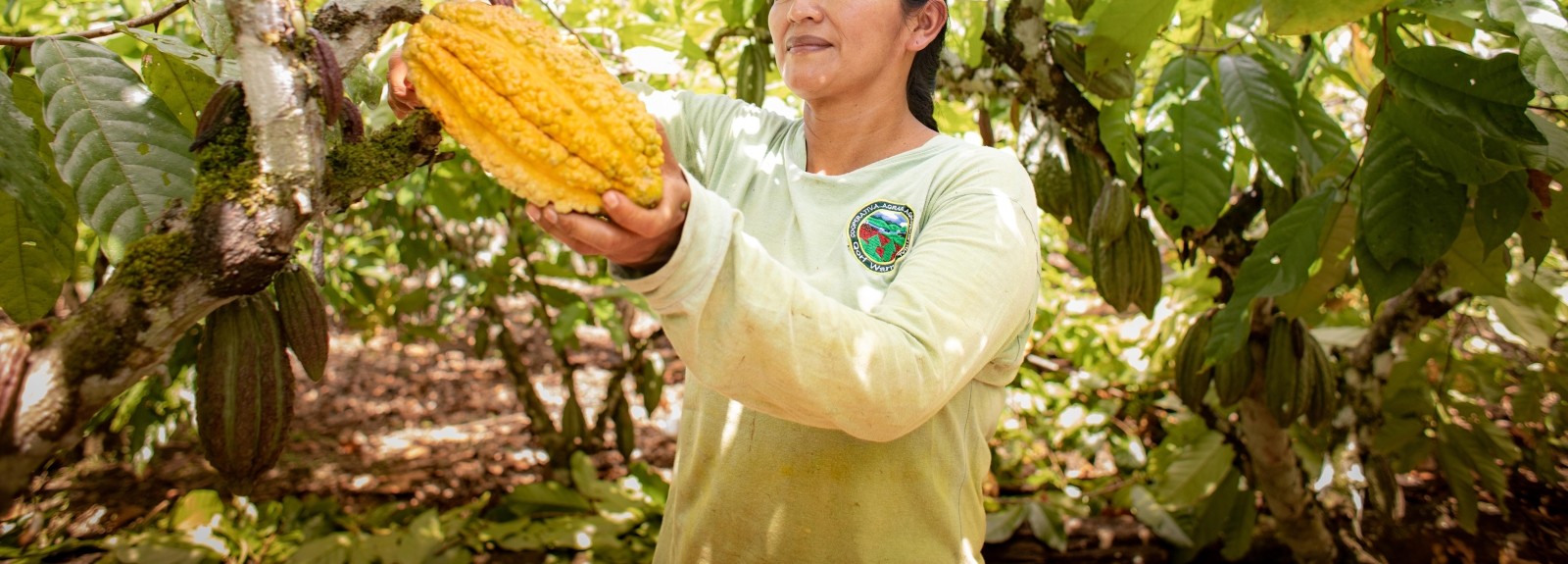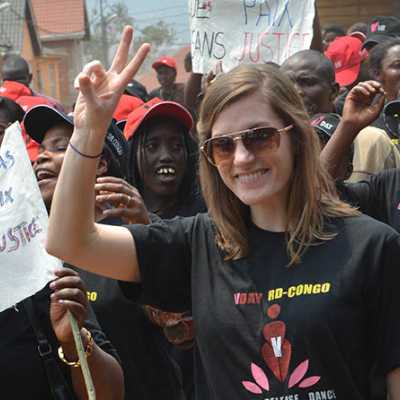“We were born with nothing,” says Nora (Enma) Mendez Sinchitullo. She is sitting under the shade of the cacao trees on her farm in Peru as she shares her journey as a farmer-turned-chocolate maker.
Today, Enma has a gold medal from a prestigious international chocolate competition. “People are surprised at how rapidly we’ve grown,” she says. “We have investors."
But her life has not always been filled with so much hope.
Replacing coca with cacao in Peru
Enma lives in the Valley of the Apurímac, Ene and Mantaro Rivers (known as the VRAEM) — one of the poorest and hardest-to-reach regions of Peru.
This region is notorious for producing the coca leaves used in illegal cocaine production, and up to 77% of families here live in poverty. The drug trade has led to violence and terrorism, and many men have lost their lives to it. This has left many wives, mothers and children behind to manage the land and fend for themselves.
The VRAEM is situated in Peru’s tropical southern highlands, where the Andes Mountains meet the Amazon rainforest. Although coca may grow well here, poor farming families are discovering it is not the only way to make a living. The valley’s fertile soil is perfect for growing a crop that is better in every way: a native variety of fine aromatic cacao highly sought after in the global cocoa market.
Sonia Doris Rodriguez Nyosa, Qori Warmi president, and Elsa Ospino, LWR cacao agronomist, work together to shell recently harvested cacao.
Empowering and uniting women cacao farmers
That’s when you come in. To help women farmers like Enma increase their incomes and cultivate a healthier future, in 2018 Lutheran World Relief supported a small group to establish a cacao farming cooperative called Qori Warmi, which translates to “Women of Gold.”
Through your kind support, the women have learned all aspects of growing and processing cacao — from the cultivation of the soil all the way through production and marketing.
"Before Qori Warmi, we did not ferment cacao correctly," says member Daria Hinostroza Prado. "The middlemen would come, look at our cacao and say the quality was not good, and they would have control over setting the price. Now they pay us that price that we demand."
Daria Hinostroza Prado rakes drying cacao beans harvested on the farm she operates with her husband.
Starting with just 35 members, the cooperative grew to 85 by 2023. And, with your support — combined with their hard work and growing confidence — the women of Qori Warmi continue to improve their farms, their cacao and their futures.
From seed to bar: Capturing the world’s attention through chocolate
Farming high quality cacao was only the beginning of their transformation. The cooperative also founded their own chocolate company, called Tsinane, which has consistently won international awards the past few years — including the top prize at the prestigious Salon du Chocolat in Paris last year.
Tsinane chocolate bars for sale in a hotel in Pichari, Peru.
Enma, who lives deep in the rainforest, traveled to France to accept the award on behalf of the cooperative — an experience she never thought possible.
“My children said, ‘Wow, mom, you're really going to go!’” she recalls. “And they wonder, if I'm able to go, will they one day get to go too? ... When I arrived in France I said, ‘Uh, am I really here?’ I pinched myself!”
Chocolate changes lives
Award-winning chocolate is not the only byproduct of this collaboration. The changes in income, opportunity and hope amongst the Qori Warmi members are remarkable.
“When I started … my husband initially laughed,” Enma remembers. “‘Oh, a women's cooperative,’ he said jokingly. But it became a reality.”
“In earlier times, organizations had involvement of only men,” she continues. “Someone would come to look for you — some organization, an [agricultural specialist] engineer — and he would say: ‘Where is your husband?’ The woman was always inside the home or in the kitchen. Now, with this change, we can also answer their questions. We also know about cacao, how you work it.”
Fermented and dried cacao beans being sorted at the Qori Warmi cooperative in Peru.
And because the program has a strong focus on quality, it helps women produce sought-after beans that command higher prices. As a result, Enma’s profits, like that of many impoverished women in the valley, have greatly improved. She intends to use this higher income to improve her children’s education and future career paths.
For the first time, Enma and the other women in the VRAEM feel they have a voice and a place in society. “It’s based on us wanting it too,” she says. “To be considered equal in gender with men, and for women not to be submissive.”
The transformation is clear, and kind donors like you helped to make it possible.
“The first organization that didn’t give up on us and moved us forward was Lutheran World Relief,” Enma says. “It’s thanks to LWR that we are who we are.”



